# Objective
- Time have `Reflect`, but doesn't have `FromReflect`.
## Solution
- Add it for `Timer`, `Stopwatch` and `TimerMode`.
---
## Changelog
### Added
* `FromReflect` derive for `Timer`, `Stopwatch` and `TimerMode`.
# Objective
Bevy still has many instances of using single-tuples `(T,)` to create a bundle. Due to #2975, this is no longer necessary.
## Solution
Search for regex `\(.+\s*,\)`. This should have found every instance.
# Objective
Fix the soundness issue outlined in #5866. In short the problem is that `query.to_readonly().get_component_mut::<T>()` can provide unsound mutable access to the component. This PR is an alternative to just removing the offending api. Given that `to_readonly` is a useful tool, I think this approach is a preferable short term solution. Long term I think theres a better solution out there, but we can find that on its own time.
## Solution
Add what amounts to a "dirty flag" that marks Queries that have been converted to their read-only variant via `to_readonly` as dirty. When this flag is set to true, `get_component_mut` will fail with an error, preventing the unsound access.
# Objective
Following discussion on #3536 and #3522, `Handle::as_weak()` takes a type `U`, reinterpreting the handle as of another asset type while keeping the same ID. This is mainly used today in font atlas code. This PR does two things:
- Rename the method to `cast_weak()` to make its intent more clear
- Actually change the type uuid in the handle if it's not an asset path variant.
## Migration Guide
- Rename `Handle::as_weak` uses to `Handle::cast_weak`
The method now properly sets the associated type uuid if the handle is a direct reference (e.g. not a reference to an `AssetPath`), so adjust you code accordingly if you relied on the previous behavior.
# Objective
Currently for entities we serialize only `id`. But this is not very expected behavior. For example, in networking, when the server sends its state, it contains entities and components. On the client, I create new objects and map them (using `EntityMap`) to those received from the server (to know which one matches which). And if `generation` field is missing, this mapping can be broken. Example:
1. Server sends an entity `Entity{ id: 2, generation: 1}` with components.
2. Client puts the received entity in a map and create a new entity that maps to this received entity. The new entity have different `id` and `generation`. Let's call it `Entity{ id: 12, generation: 4}`.
3. Client sends a command for `Entity{ id: 12, generation: 4}`. To do so, it maps local entity to the one from server. But `generation` field is 0 because it was omitted for serialization on the server. So it maps to `Entity{ id: 2, generation: 0}`.
4. Server receives `Entity{ id: 2, generation: 0}` which is invalid.
In my game I worked around it by [writing custom serialization](https://github.com/dollisgame/dollis/blob/master/src/core/network/entity_serde.rs) and using `serde(with = "...")`. But it feels like a bad default to me.
Using `Entity` over a custom `NetworkId` also have the following advantages:
1. Re-use `MapEntities` trait to map `Entity`s in replicated components.
2. Instead of server `Entity <-> NetworkId ` and `Entity <-> NetworkId`, we map entities only on client.
3. No need to handling uniqueness. It's a rare case, but makes things simpler. For example, I don't need to query for a resource to create an unique ID.
Closes#6143.
## Solution
Use default serde impls. If anyone want to avoid wasting memory on `generation`, they can create a new type that holds `u32`. This is what Bevy do for [DynamicEntity](https://docs.rs/bevy/latest/bevy/scene/struct.DynamicEntity.html) to serialize scenes. And I don't see any use case to serialize an entity id expect this one.
---
## Changelog
### Changed
- Entity now serializes / deserializes `generation` field.
## Migration Guide
- Entity now fully serialized. If you want to serialze only `id`, as it was before, you can create a new type that wraps `u32`.
# Objective
- fix new clippy lints before they get stable and break CI
## Solution
- run `clippy --fix` to auto-fix machine-applicable lints
- silence `clippy::should_implement_trait` for `fn HandleId::default<T: Asset>`
## Changes
- always prefer `format!("{inline}")` over `format!("{}", not_inline)`
- prefer `Box::default` (or `Box::<T>::default` if necessary) over `Box::new(T::default())`
# Objective
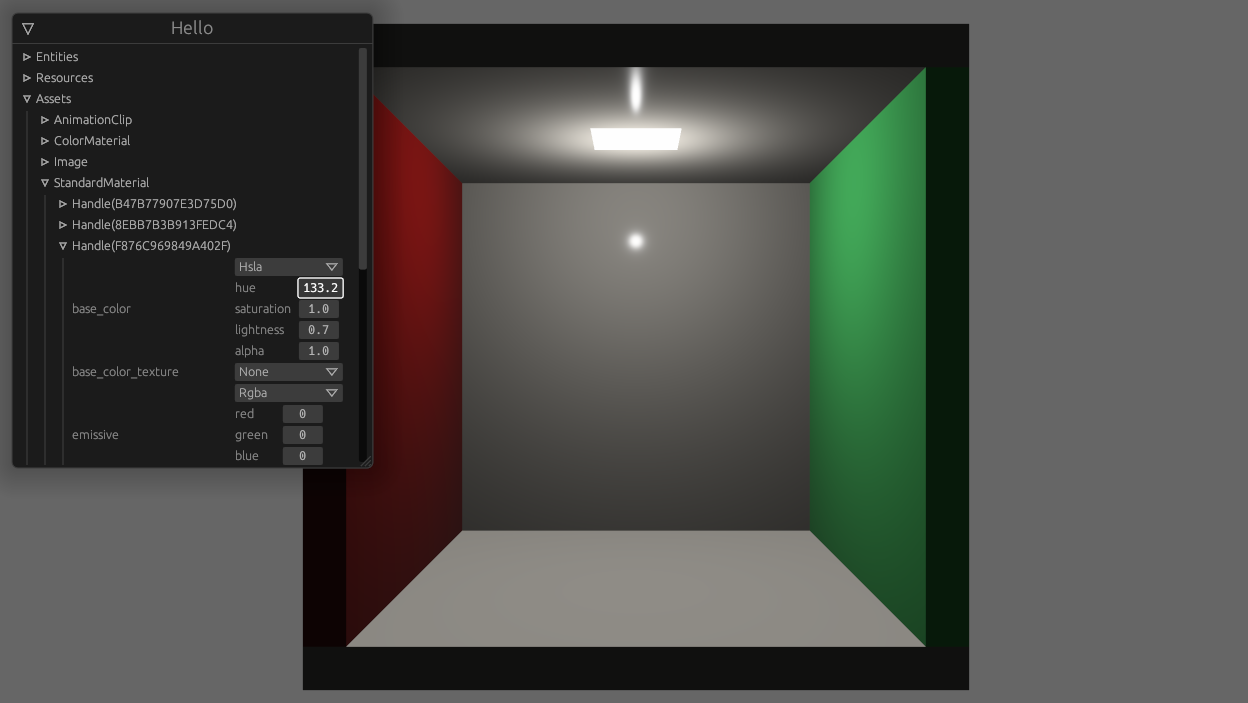
^ enable this
Concretely, I need to
- list all handle ids for an asset type
- fetch the asset as `dyn Reflect`, given a `HandleUntyped`
- when encountering a `Handle<T>`, find out what asset type that handle refers to (`T`'s type id) and turn the handle into a `HandleUntyped`
## Solution
- add `ReflectAsset` type containing function pointers for working with assets
```rust
pub struct ReflectAsset {
type_uuid: Uuid,
assets_resource_type_id: TypeId, // TypeId of the `Assets<T>` resource
get: fn(&World, HandleUntyped) -> Option<&dyn Reflect>,
get_mut: fn(&mut World, HandleUntyped) -> Option<&mut dyn Reflect>,
get_unchecked_mut: unsafe fn(&World, HandleUntyped) -> Option<&mut dyn Reflect>,
add: fn(&mut World, &dyn Reflect) -> HandleUntyped,
set: fn(&mut World, HandleUntyped, &dyn Reflect) -> HandleUntyped,
len: fn(&World) -> usize,
ids: for<'w> fn(&'w World) -> Box<dyn Iterator<Item = HandleId> + 'w>,
remove: fn(&mut World, HandleUntyped) -> Option<Box<dyn Reflect>>,
}
```
- add `ReflectHandle` type relating the handle back to the asset type and providing a way to create a `HandleUntyped`
```rust
pub struct ReflectHandle {
type_uuid: Uuid,
asset_type_id: TypeId,
downcast_handle_untyped: fn(&dyn Any) -> Option<HandleUntyped>,
}
```
- add the corresponding `FromType` impls
- add a function `app.register_asset_reflect` which is supposed to be called after `.add_asset` and registers `ReflectAsset` and `ReflectHandle` in the type registry
---
## Changelog
- add `ReflectAsset` and `ReflectHandle` types, which allow code to use reflection to manipulate arbitrary assets without knowing their types at compile time
fixes https://github.com/bevyengine/bevy/issues/5944
Uses the second solution:
> 2. keep track of the old viewport in the computed_state, and if camera.viewport != camera.computed_state.old_viewport, then update the projection. This is more reliable, but needs to store two UVec2s more in the camera (probably not a big deal).
# Objective
Clean up code surrounding fetch by pulling out the common parts into the iteration code.
## Solution
Merge `Fetch::table_fetch` and `Fetch::archetype_fetch` into a single API: `Fetch::fetch(&mut self, entity: &Entity, table_row: &usize)`. This provides everything any fetch requires to internally decide which storage to read from and get the underlying data. All of these functions are marked as `#[inline(always)]` and the arguments are passed as references to attempt to optimize out the argument that isn't being used.
External to `Fetch`, Query iteration has been changed to keep track of the table row and entity outside of fetch, which moves a lot of the expensive bookkeeping `Fetch` structs had previously done internally into the outer loop.
~~TODO: Benchmark, docs~~ Done.
---
## Changelog
Changed: `Fetch::table_fetch` and `Fetch::archetype_fetch` have been merged into a single `Fetch::fetch` function.
## Migration Guide
TODO
Co-authored-by: Brian Merchant <bhmerchang@gmail.com>
Co-authored-by: Saverio Miroddi <saverio.pub2@gmail.com>
# Objective
Currently, `DynamicSceneBuilder` keeps track of entities via a `HashMap`. This has an unintended side-effect in that, when building the full `DynamicScene`, we aren't guaranteed any particular order.
In other words, inserting Entity A then Entity B can result in either `[A, B]` or `[B, A]`. This can be rather annoying when running tests on scenes generated via the builder as it will work sometimes but not other times. There's also the potential that this might unnecessarily clutter up VCS diffs for scene files (assuming they had an intentional order).
## Solution
Store `DynamicSceneBuilder`'s entities in a `Vec` rather than a `HashMap`.
---
## Changelog
* Stablized entity order in `DynamicSceneBuilder` (0.9.0-dev)
# Objective
Bevy's internal plugins have lots of execution-order ambiguities, which makes the ambiguity detection tool very noisy for our users.
## Solution
Silence every last ambiguity that can currently be resolved.
Each time an ambiguity is silenced, it is accompanied by a comment describing why it is correct. This description should be based on the public API of the respective systems. Thus, I have added documentation to some systems describing how they use some resources.
# Future work
Some ambiguities remain, due to issues out of scope for this PR.
* The ambiguity checker does not respect `Without<>` filters, leading to false positives.
* Ambiguities between `bevy_ui` and `bevy_animation` cannot be resolved, since neither crate knows that the other exists. We will need a general solution to this problem.
# Objective
- Fixes#5876 .
## Solution
- added pub use statements to re-export the following traits in bevy_audio: rodio::source::Source, rodio::Sample, rodio::cpal::Sample.
- rodio::cpal::Sample was re-exported as CpalSample to avoid naming conflict with rodio::Sample.
# Objective
Currently scenes define components using a list:
```rust
[
(
entity: 0,
components: [
{
"bevy_transform::components::transform::Transform": (
translation: (
x: 0.0,
y: 0.0,
z: 0.0
),
rotation: (0.0, 0.0, 0.0, 1.0),
scale: (
x: 1.0,
y: 1.0,
z: 1.0
),
),
},
{
"my_crate::Foo": (
text: "Hello World",
),
},
{
"my_crate::Bar": (
baz: 123,
),
},
],
),
]
```
However, this representation has some drawbacks (as pointed out by @Metadorius in [this](https://github.com/bevyengine/bevy/pull/4561#issuecomment-1202215565) comment):
1. Increased nesting and more characters (minor effect on overall size)
2. More importantly, by definition, entities cannot have more than one instance of any given component. Therefore, such data is best stored as a map— where all values are meant to have unique keys.
## Solution
Change `components` to store a map of components rather than a list:
```rust
[
(
entity: 0,
components: {
"bevy_transform::components::transform::Transform": (
translation: (
x: 0.0,
y: 0.0,
z: 0.0
),
rotation: (0.0, 0.0, 0.0, 1.0),
scale: (
x: 1.0,
y: 1.0,
z: 1.0
),
),
"my_crate::Foo": (
text: "Hello World",
),
"my_crate::Bar": (
baz: 123
),
},
),
]
```
#### Code Representation
This change only affects the scene format itself. `DynamicEntity` still stores its components as a list. The reason for this is that storing such data as a map is not really needed since:
1. The "key" of each value is easily found by just calling `Reflect::type_name` on it
2. We should be generating such structs using the `World` itself which upholds the one-component-per-entity rule
One could in theory create manually create a `DynamicEntity` with duplicate components, but this isn't something I think we should focus on in this PR. `DynamicEntity` can be broken in other ways (i.e. storing a non-component in the components list), and resolving its issues can be done in a separate PR.
---
## Changelog
* The scene format now uses a map to represent the collection of components rather than a list
## Migration Guide
The scene format now uses a map to represent the collection of components. Scene files will need to update from the old list format.
<details>
<summary>Example Code</summary>
```rust
// OLD
[
(
entity: 0,
components: [
{
"bevy_transform::components::transform::Transform": (
translation: (
x: 0.0,
y: 0.0,
z: 0.0
),
rotation: (0.0, 0.0, 0.0, 1.0),
scale: (
x: 1.0,
y: 1.0,
z: 1.0
),
),
},
{
"my_crate::Foo": (
text: "Hello World",
),
},
{
"my_crate::Bar": (
baz: 123,
),
},
],
),
]
// NEW
[
(
entity: 0,
components: {
"bevy_transform::components::transform::Transform": (
translation: (
x: 0.0,
y: 0.0,
z: 0.0
),
rotation: (0.0, 0.0, 0.0, 1.0),
scale: (
x: 1.0,
y: 1.0,
z: 1.0
),
),
"my_crate::Foo": (
text: "Hello World",
),
"my_crate::Bar": (
baz: 123
),
},
),
]
```
</details>
# Objective
Currently, Bevy only supports rendering to the current "surface texture format". This means that "render to texture" scenarios must use the exact format the primary window's surface uses, or Bevy will crash. This is even harder than it used to be now that we detect preferred surface formats at runtime instead of using hard coded BevyDefault values.
## Solution
1. Look up and store each window surface's texture format alongside other extracted window information
2. Specialize the upscaling pass on the current `RenderTarget`'s texture format, now that we can cheaply correlate render targets to their current texture format
3. Remove the old `SurfaceTextureFormat` and `AvailableTextureFormats`: these are now redundant with the information stored on each extracted window, and probably should not have been globals in the first place (as in theory each surface could have a different format).
This means you can now use any texture format you want when rendering to a texture! For example, changing the `render_to_texture` example to use `R16Float` now doesn't crash / properly only stores the red component:
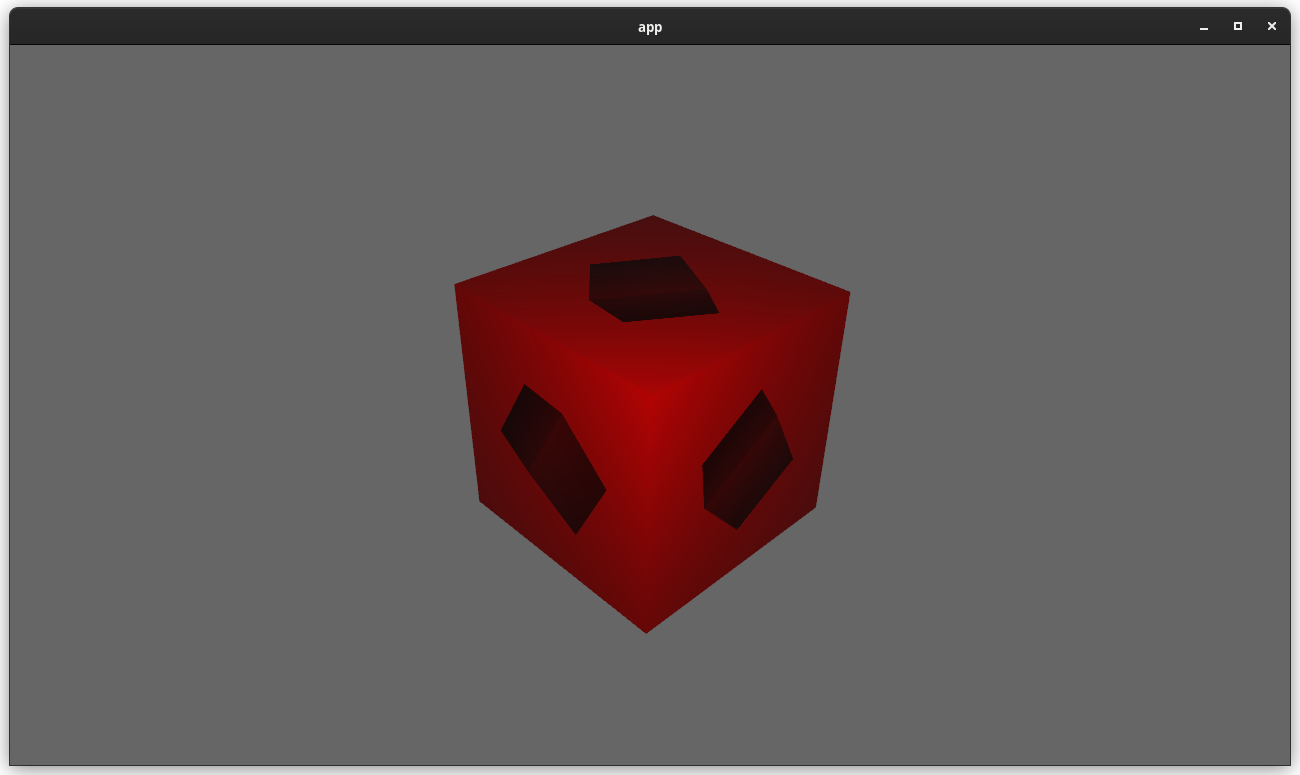
Attempt to make features like bloom https://github.com/bevyengine/bevy/pull/2876 easier to implement.
**This PR:**
- Moves the tonemapping from `pbr.wgsl` into a separate pass
- also add a separate upscaling pass after the tonemapping which writes to the swap chain (enables resolution-independant rendering and post-processing after tonemapping)
- adds a `hdr` bool to the camera which controls whether the pbr and sprite shaders render into a `Rgba16Float` texture
**Open questions:**
- ~should the 2d graph work the same as the 3d one?~ it is the same now
- ~The current solution is a bit inflexible because while you can add a post processing pass that writes to e.g. the `hdr_texture`, you can't write to a separate `user_postprocess_texture` while reading the `hdr_texture` and tell the tone mapping pass to read from the `user_postprocess_texture` instead. If the tonemapping and upscaling render graph nodes were to take in a `TextureView` instead of the view entity this would almost work, but the bind groups for their respective input textures are already created in the `Queue` render stage in the hardcoded order.~ solved by creating bind groups in render node
**New render graph:**
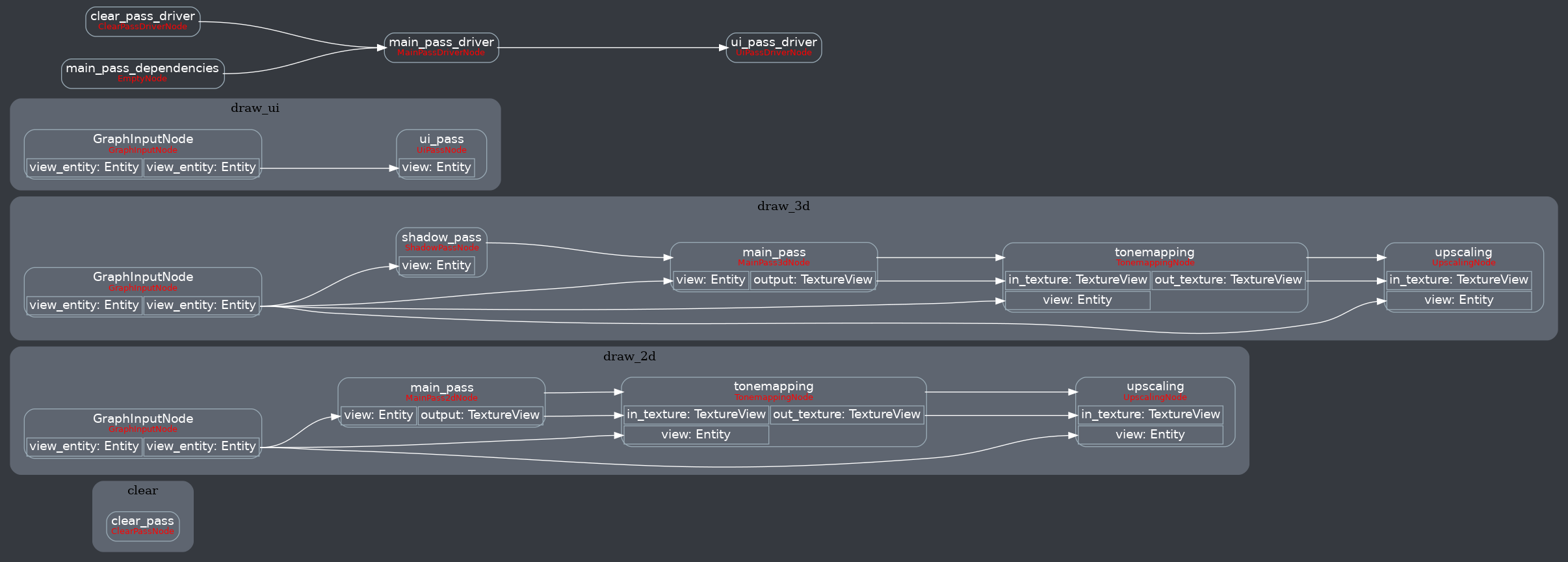
<details>
<summary>Before</summary>
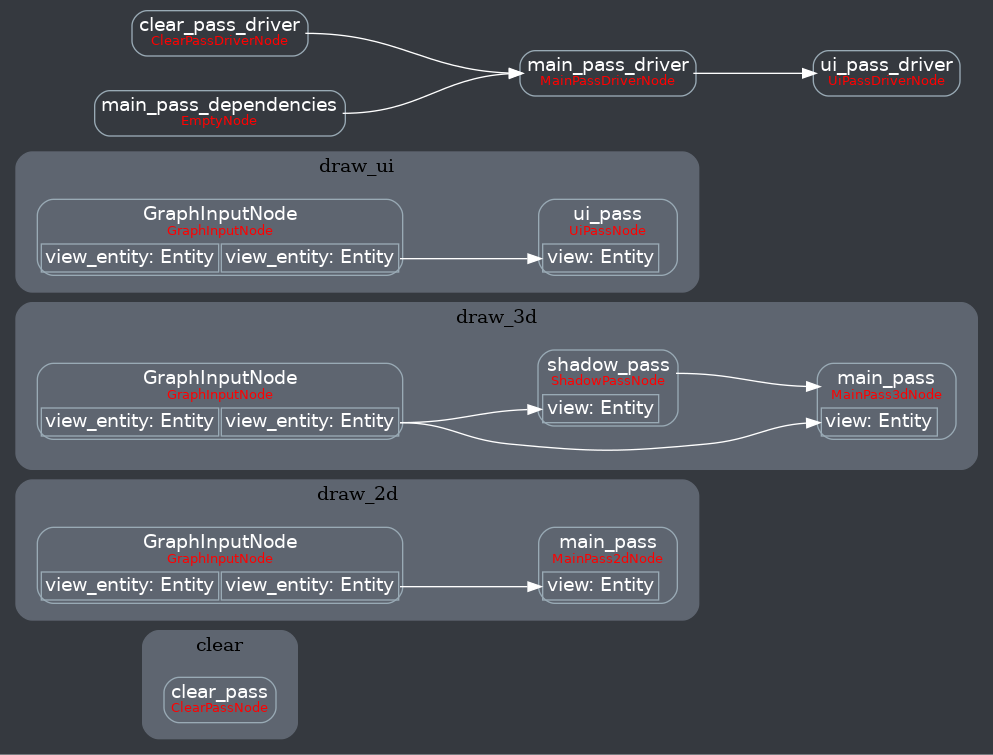
</details>
Co-authored-by: Carter Anderson <mcanders1@gmail.com>
# Objective
Adds support for reflecting many more of the input types. This allows those types to be used via scripting, `bevy-inspector-egui`, etc. These types are registered by the `InputPlugin` so that they're automatically available to anyone who wants to use them
Closes#6223
## Solution
Many types now have `#[derive(Reflect, FromReflect)]` added to them in `bevy_input`. Additionally, `#[reflect(traits...)]` has been added for applicable traits to the types.
This PR does not add reflection support for types which have private fields. Notably, `Touch` and `Touches` don't implement `Reflect`/`FromReflect`.
This adds the "glam" feature to the `bevy_reflect` dependency for package `bevy_input`. Since `bevy_input` transitively depends on `glam` already, all this brings in are the reflection `impl`s.
## Migration Guide
- `Input<T>` now implements `Reflect` via `#[reflect]` instead of `#[reflect_value]`. This means it now exposes its private fields via the `Reflect` trait rather than being treated as a value type. For code that relies on the `Input<T>` struct being treated as a value type by reflection, it is still possible to wrap the `Input<T>` type with a wrapper struct and apply `#[reflect_value]` to it.
- As a reminder, private fields exposed via reflection are not subject to any stability guarantees.
---
## Changelog
Added
- Implemented `Reflect` + `FromReflect` for many input-related types. These types are automatically registered when adding the `InputPlugin`.
# Objective
- Proactive changing of code to comply with warnings generated by beta of rustlang version of cargo clippy.
## Solution
- Code changed as recommended by `rustup update`, `rustup default beta`, `cargo run -p ci -- clippy`.
- Tested using `beta` and `stable`. No clippy warnings in either after changes made.
---
## Changelog
- Warnings fixed were: `clippy::explicit-auto-deref` (present in 11 files), `clippy::needless-borrow` (present in 2 files), and `clippy::only-used-in-recursion` (only 1 file).
# Objective
- Some tests are very flaky on a m1
- m1 currently have a 41 ns precision
## Solution
- Do not run tests that compare a `Duration` or a `f64` on a m1 (and m2)
# Objective
- Make the settings of plugins readable during app building
## Solution
- Added a vector of added plugins to the app. Their settings can be accessed as read only
# Objective
- Do not implement `Copy` or `Clone` for `Fetch` types as this is kind of sus soundness wise (it feels like cloning an `IterMut` in safe code to me). Cloning a fetch seems important to think about soundness wise when doing it so I prefer this over adding a `Clone` bound to the assoc type definition (i.e. `type Fetch: Clone`) even though that would also solve the other listed things here.
- Remove a bunch of `QueryFetch<'w, Q>: Clone` bounds from our API as now all fetches can be "cloned" for use in `iter_combinations`. This should also help avoid the type inference regression ptrification introduced where `for<'a> QueryFetch<'a, Q>: Trait` bounds misbehave since we no longer need any of those kind of higher ranked bounds (although in practice we had none anyway).
- Stop being able to "forget" to implement clone for fetches, we've had a lot of issues where either `derive(Clone)` was used instead of a manual impl (so we ended up with too tight bounds on the impl) or flat out forgot to implement Clone at all. With this change all fetches are able to be cloned for `iter_combinations` so this will no longer be possible to mess up.
On an unrelated note, while making this PR I realised we probably want safety invariants on `archetype/table_fetch` that nothing aliases the table_row/archetype_index according to the access we set.
---
## Changelog
`Clone` and `Copy` were removed from all `Fetch` types.
## Migration Guide
- Call `WorldQuery::clone_fetch` instead of `fetch.clone()`. Make sure to add safety comments :)
# Objective
- Build on #6336 for more plugin configurations
## Solution
- `LogSettings`, `ImageSettings` and `DefaultTaskPoolOptions` are now plugins settings rather than resources
---
## Changelog
- `LogSettings` plugin settings have been move to `LogPlugin`, `ImageSettings` to `ImagePlugin` and `DefaultTaskPoolOptions` to `CorePlugin`
## Migration Guide
The `LogSettings` settings have been moved from a resource to `LogPlugin` configuration:
```rust
// Old (Bevy 0.8)
app
.insert_resource(LogSettings {
level: Level::DEBUG,
filter: "wgpu=error,bevy_render=info,bevy_ecs=trace".to_string(),
})
.add_plugins(DefaultPlugins)
// New (Bevy 0.9)
app.add_plugins(DefaultPlugins.set(LogPlugin {
level: Level::DEBUG,
filter: "wgpu=error,bevy_render=info,bevy_ecs=trace".to_string(),
}))
```
The `ImageSettings` settings have been moved from a resource to `ImagePlugin` configuration:
```rust
// Old (Bevy 0.8)
app
.insert_resource(ImageSettings::default_nearest())
.add_plugins(DefaultPlugins)
// New (Bevy 0.9)
app.add_plugins(DefaultPlugins.set(ImagePlugin::default_nearest()))
```
The `DefaultTaskPoolOptions` settings have been moved from a resource to `CorePlugin::task_pool_options`:
```rust
// Old (Bevy 0.8)
app
.insert_resource(DefaultTaskPoolOptions::with_num_threads(4))
.add_plugins(DefaultPlugins)
// New (Bevy 0.9)
app.add_plugins(DefaultPlugins.set(CorePlugin {
task_pool_options: TaskPoolOptions::with_num_threads(4),
}))
```
# Objective
This is a follow-up to #6317, which makes use of a feature of the newest `trybuild` version, `1.0.71`, but does not specify the new patch version in `bevy_ecs_compile_fail_tests/Cargo.toml`.
The PR passed CI because CI downloaded the latest `trybuild` version satisfying the dependency specification. However, Cargo will not know an update is required if a user already has a `^1.0` version of `trybuild` cached locally, which causes the new `$N` syntax to fail the tests.
## Solution
Updated the `trybuild` requirement to `1.0.71`.
# Objective
- Reverts unnecessary version increase for `thiserror` caused by the following PR. 9066d51420
- The aforementioned PR should have increased `thiserrror` version uniformly across all bevy crates. As far as I can tell it was unneccessary to bump versions
## Solution
- Revert versions to the matching version used by other bevy "crates"
```
MBP-Larry-Du.local:~/Code/bevy:$ git grep thiserror
CHANGELOG.md:- [Derive thiserror::Error for HexColorError][2740]
crates/bevy_asset/Cargo.toml:thiserror = "1.0"
crates/bevy_asset/src/asset_server.rs:use thiserror::Error;
crates/bevy_asset/src/io/mod.rs:use thiserror::Error;
crates/bevy_gltf/Cargo.toml:thiserror = "1.0"
crates/bevy_gltf/src/loader.rs:use thiserror::Error;
crates/bevy_input/Cargo.toml:thiserror = "1.0"
crates/bevy_input/src/gamepad.rs:use thiserror::Error;
crates/bevy_reflect/Cargo.toml:thiserror = "1.0"
crates/bevy_reflect/src/path.rs:use thiserror::Error;
crates/bevy_render/Cargo.toml:thiserror = "1.0"
```
---
## Changelog
> This section is optional. If this was a trivial fix, or has no externally-visible impact, you can delete this section.
- What changed as a result of this PR? Fixed dependency conflict for building projects.
Current build of StarRust runs successfully with the `thiserror` reversion: https://github.com/LarsDu/StarRust
But will run into dependency conflicts if `thiserror` is version 1.037
Co-authored-by: Larry Du <larry.du@freenome.com>
# Objective
I was trying to implement a collision system for my game, and believed that the iter_combinations method might be what I need. But I couldn't find a simple explanation of what a combination was in Bevy and thought it could use some more explanation.
## Solution
I added some description to the documentation that can hopefully further elaborate on what a combination is.
I also changed up the docs for the method because a combination is a different thing than a permutation but the Bevy docs seemed to use them interchangeably.
# Objective
- `QueryCombinationIter` can have sizes greater than `usize::MAX`.
- Fixes#5846
## Solution
- Only the implementation of `ExactSizeIterator` has been removed. Instead of using `query_combination.len()`, you can use `query_combination.size_hint().0` to get the same value as before.
---
## Migration Guide
- Switch to using other methods of getting the length.
# Objective
Fixes#5884#2879
Alternative to #2988#5885#2886
"Immutable" Plugin settings are currently represented as normal ECS resources, which are read as part of plugin init. This presents a number of problems:
1. If a user inserts the plugin settings resource after the plugin is initialized, it will be silently ignored (and use the defaults instead)
2. Users can modify the plugin settings resource after the plugin has been initialized. This creates a false sense of control over settings that can no longer be changed.
(1) and (2) are especially problematic and confusing for the `WindowDescriptor` resource, but this is a general problem.
## Solution
Immutable Plugin settings now live on each Plugin struct (ex: `WindowPlugin`). PluginGroups have been reworked to support overriding plugin values. This also removes the need for the `add_plugins_with` api, as the `add_plugins` api can use the builder pattern directly. Settings that can be used at runtime continue to be represented as ECS resources.
Plugins are now configured like this:
```rust
app.add_plugin(AssetPlugin {
watch_for_changes: true,
..default()
})
```
PluginGroups are now configured like this:
```rust
app.add_plugins(DefaultPlugins
.set(AssetPlugin {
watch_for_changes: true,
..default()
})
)
```
This is an alternative to #2988, which is similar. But I personally prefer this solution for a couple of reasons:
* ~~#2988 doesn't solve (1)~~ #2988 does solve (1) and will panic in that case. I was wrong!
* This PR directly ties plugin settings to Plugin types in a 1:1 relationship, rather than a loose "setup resource" <-> plugin coupling (where the setup resource is consumed by the first plugin that uses it).
* I'm not a huge fan of overloading the ECS resource concept and implementation for something that has very different use cases and constraints.
## Changelog
- PluginGroups can now be configured directly using the builder pattern. Individual plugin values can be overridden by using `plugin_group.set(SomePlugin {})`, which enables overriding default plugin values.
- `WindowDescriptor` plugin settings have been moved to `WindowPlugin` and `AssetServerSettings` have been moved to `AssetPlugin`
- `app.add_plugins_with` has been replaced by using `add_plugins` with the builder pattern.
## Migration Guide
The `WindowDescriptor` settings have been moved from a resource to `WindowPlugin::window`:
```rust
// Old (Bevy 0.8)
app
.insert_resource(WindowDescriptor {
width: 400.0,
..default()
})
.add_plugins(DefaultPlugins)
// New (Bevy 0.9)
app.add_plugins(DefaultPlugins.set(WindowPlugin {
window: WindowDescriptor {
width: 400.0,
..default()
},
..default()
}))
```
The `AssetServerSettings` resource has been removed in favor of direct `AssetPlugin` configuration:
```rust
// Old (Bevy 0.8)
app
.insert_resource(AssetServerSettings {
watch_for_changes: true,
..default()
})
.add_plugins(DefaultPlugins)
// New (Bevy 0.9)
app.add_plugins(DefaultPlugins.set(AssetPlugin {
watch_for_changes: true,
..default()
}))
```
`add_plugins_with` has been replaced by `add_plugins` in combination with the builder pattern:
```rust
// Old (Bevy 0.8)
app.add_plugins_with(DefaultPlugins, |group| group.disable::<AssetPlugin>());
// New (Bevy 0.9)
app.add_plugins(DefaultPlugins.build().disable::<AssetPlugin>());
```
# Objective
Scenes are currently represented as a list of entities. This is all we need currently, but we may want to add more data to this format in the future (metadata, asset lists, etc.).
It would be nice to update the format in preparation of possible future changes. Doing so now (i.e., before 0.9) could mean reduced[^1] breakage for things added in 0.10.
[^1]: Obviously, adding features runs the risk of breaking things regardless. But if all features added are for whatever reason optional or well-contained, then users should at least have an easier time updating.
## Solution
Made the scene root a struct rather than a list.
```rust
(
entities: [
// Entity data here...
]
)
```
---
## Changelog
* The scene format now puts the entity list in a newly added `entities` field, rather than having it be the root object
## Migration Guide
The scene file format now uses a struct as the root object rather than a list of entities. The list of entities is now found in the `entities` field of this struct.
```rust
// OLD
[
(
entity: 0,
components: [
// Components...
]
),
]
// NEW
(
entities: [
(
entity: 0,
components: [
// Components...
]
),
]
)
```
Co-authored-by: Gino Valente <49806985+MrGVSV@users.noreply.github.com>
# Objective
- You usually want to say that a given animation *should* be playing, doing nothing if it's already playing.
## Solution
- Rename play to start and add new play method that won't overwrite the existing animation if it's already playing #6350
---
## Changelog
### Changed
`AnimationPlayer::play` will now not restart the animation if it's already playing
### Added
An `AnimationPlayer ::start` method, which has the old behavior of `play`
## Migration guide
- If you were using `play` to restart an animation that was already playing, that functionality has been moved to `start`. Now, `play` won't have any effect if the requested animation is already playing.
# Objective
Improve ergonomics by passing on the `IntoIterator` impl of the underlying type to wrapper types.
## Solution
Implement `IntoIterator` for ECS wrapper types (Mut, Local, Res, etc.).
Co-authored-by: devil-ira <justthecooldude@gmail.com>
# Objective
- Improve #3953
## Solution
- The very specific circumstances under which the render world is reset meant that the flush_as_invalid function could be replaced with one that had a noop as its init method.
- This removes a double-writing issue leading to greatly increased performance.
Running the reproduction code in the linked issue, this change nearly doubles the framerate.
Co-authored-by: Carter Anderson <mcanders1@gmail.com>
# Objective
- Avoids creating a `SurfaceConfiguration` for every window in every frame for the `prepare_windows` system
- As such also avoid calling `get_supported_formats` for every window in every frame
## Solution
- Construct `SurfaceConfiguration` lazyly in `prepare_windows`
---
This also changes the error message for failed initial surface configuration from "Failed to acquire next swapchain texture" to "Error configuring surface".
# Objective
When running the scene example, you might notice we end up printing out the following:
```ron
// ...
{
"scene::ComponentB": (
value: "hello",
_time_since_startup: (
secs: 0,
nanos: 0,
),
),
},
// ...
```
We should not be printing out `_time_since_startup` as the field is marked with `#[reflect(skip_serializing)]`:
```rust
#[derive(Component, Reflect)]
#[reflect(Component)]
struct ComponentB {
pub value: String,
#[reflect(skip_serializing)]
pub _time_since_startup: Duration,
}
```
This is because when we create the `DynamicScene`, we end up calling `Reflect::clone_value`:
82126697ee/crates/bevy_scene/src/dynamic_scene_builder.rs (L114-L114)
This results in non-Value types being cloned into Dynamic types, which means the `TypeId` returned from `reflected_value.type_id()` is not the same as the original component's.
And this meant we were not able to locate the correct `TypeRegistration`.
## Solution
Use `TypeInfo::type_id()` instead of calling `Any::type_id()` on the value directly.
---
## Changelog
* Fix a bug introduced in `0.9.0-dev` where scenes disregarded component's type registrations
# Objective
- Clipping (visible in the UI example with text scrolling) is funky
- Fixes#6287
## Solution
- Fix UV calculation:
- correct order for values (issue introduced in #6000)
- add the `y` values instead of subtracting them now that vertical order is reversed
- take scale factor into account (bug already present before reversing the order)
- While around clipping, I changed clip to only mutate when changed
No more funkiness! 😞
<img width="696" alt="Screenshot 2022-10-23 at 22 44 18" src="https://user-images.githubusercontent.com/8672791/197417721-30ad4150-5264-427f-ac82-e5265c1fb3a9.png">
# Objective
Fixes#6339.
## Solution
This PR adds a new type, `GamepadInfo`, which holds metadata associated with a particular `Gamepad`. The `Gamepads` resource now holds a `HashMap<Gamepad, GamepadInfo>`. The `GamepadInfo` is created when the gamepad backend (by default `bevy_gilrs`) emits a "gamepad connected" event.
The `gamepad_viewer` example has been updated to showcase the new functionality.
Before:
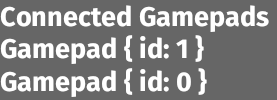
After:

---
## Changelog
### Added
- Added `GamepadInfo`.
- Added `Gamepads::name()`, which returns the name of the specified gamepad if it exists.
### Changed
- `GamepadEventType::Connected` is now a tuple variant with a single field of type `GamepadInfo`.
- Since `GamepadInfo` is not `Copy`, `GamepadEventType` is no longer `Copy`. The same is true of `GamepadEvent` and `GamepadEventRaw`.
## Migration Guide
- Pattern matches on `GamepadEventType::Connected` will need to be updated, as the form of the variant has changed.
- Code that requires `GamepadEvent`, `GamepadEventRaw` or `GamepadEventType` to be `Copy` will need to be updated.
I found myself doing
```rust
let child = commands.spawn(..).id();
commands.entity(parent).add_child(child);
```
When that could just be
```rust
commands.spawn(..).set_parent(parent);
```
Adding `set_parent` was trivial as it's just an `AddChild` command. Most of the changes are for `remove_parent`.
Also updated some outdated docs.
Co-authored-by: devil-ira <justthecooldude@gmail.com>
# Objective
Adds a better interface for performing mathematical operations with UI unit `Val`. Fixes#6080.
## Solution
- Added `try_add` and `try_sub` methods to Val.
- Removed the `Add` and `AddAssign` impls for `Val` that introduced unintuitive and bug-prone behaviour.
- As a consequence of the prior, ~~changed the `Add` and `Sub` impls for the `Size` struct to take a `(Val, Val)` instead of `Vec2`~~ deleted the `Add` and `Sub` impls for the `Size` struct
- Added a `From<(Val, Val)>` impl for the `Size` struct
- Added `evaluate(size: f32)` method that converts from `Val::Percent` to `Val::Px`.
- Added `try_add_with_size` and `try_sub_with_size` methods to `Val`, which evaluate `Val::Percent` values into `Val::Px` values before adding.
---
## Migration Guide
Instead of using the + and - operators, perform calculations on `Val`s using the new `try_add` and `try_sub` methods. Multiplication and division remained unchanged. Also, when adding or subtracting from `Size`, ~~use a `Val` tuple instead of `Vec2`~~ perform the addition on `width` and `height` separately.
Co-authored-by: Dawid Piotrowski <41804418+Pietrek14@users.noreply.github.com>
# Objective
Fixes#5559
Replaces #5628
## Solution
Because the generated method from_components() creates an instance of Self my implementation requires any field type that is marked to be ignored to implement Default.
---
## Changelog
Added the possibility to ignore fields in a bundle with `#[bundle(ignore)]`. Typically used when `PhantomData` needs to be added to a `Bundle`.